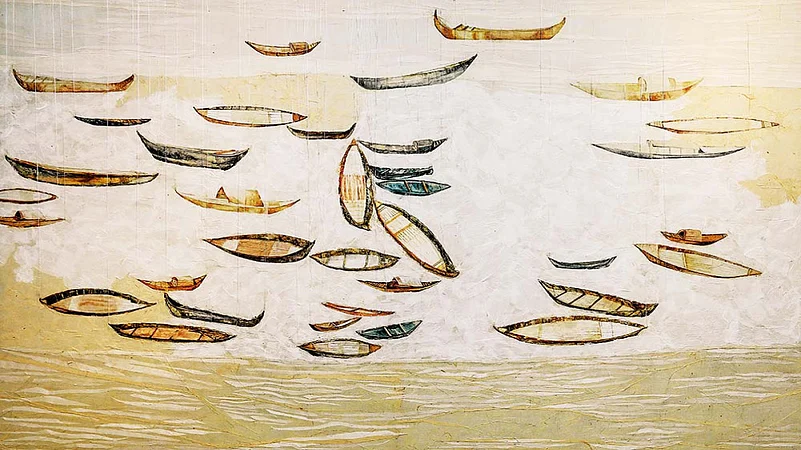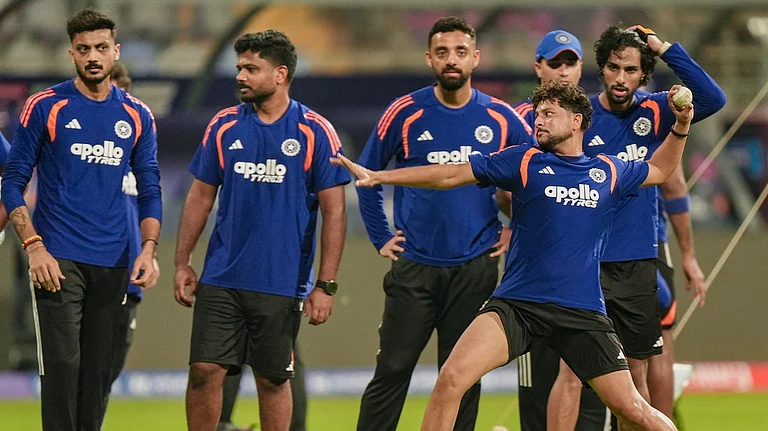I was more than 7,000 kilometres away when I first felt a strange pang in my chest that can only be defined as homesickness. In Barcelona, the chilly water of the Mediterranean Sea was licking my bare feet, and I was overcome with a longing for what I had left behind. I was to return to Mumbai soon, but at the time, five months was the longest I had ever been away. On the beach with me that day was the man I would later marry. This is what my city looks like, I said to him. This is how it smells.
The comparison seems thin in hindsight, but I wasn’t lying when I drew it. After the refined sterility of the German and French cities I had visited until then, Barcelona’s rough edges, late lunches and cacophonic streets had felt refreshingly familiar. Above all, the air on the promenade by the sea had hung heavy with moisture. I was reminded of home. Between that first long separation from Mumbai and now, eight years have passed. I have since lived in three cities on two continents for stretches longer than the first time I was away. As I write this from Edinburgh, where I now live, I realise that the sea had only ever been an accessory for me, something I had rarely spared a thought for, never quite grasping the many ways in which this peripheral presence was quietly shaping me.
Nostalgia can be a dreadful thing, not least when it sprouts from the spirit of that dreadful species to which I now grudgingly belong—the non-resident Indian. It is true that I, too, lament at how different things are each time I go back home, even if I’m never really away too long. At least, the sea hasn’t changed, I say to myself, as though change were a hopeless thing to be discarded in favour of a well-defined and tangible past in which every experience ostensibly came in a flawless shape.
But only a fool would dare think that something whose very essence rests on motion and fluidity can remain unchanged. It is hard to imagine that this dense and concretised hunk of a city, jutting out from the Indian Peninsula into the Arabian Sea, was cobbled together from seven disparate islands. To believers, it may seem like the stuff of miracles—an entire metropolis rising from the water; and yet, not a trace of the poetic divine in the making of Mumbai, only the prosaic hand of practicality.
“A poor little island” is how a British member of Parliament had referred to this archipelago when the East India Company obtained it from the Portuguese in the 17th century. Soon enough, embankments were built, and land was filled into the marsh to prop it up as the Urbs Prima in Indis—the First City of India—a far cry from the poor little epithet.
***
“What is it about the sea? Is it because it’s there?” Jerry Pinto writes in his novel Em and the Big Hoom. Or is it because it’s not there? When mystery is so readily available, is it not hard to surprise ourselves? Hard in love. Hard in desire. And hard in our relationship to the sea.
I have thought more about the sea—and with a deep yearning for it—over the past few years than I did my whole life when it was less than two kilometres away from me and the salty air on my lips only at a distance of a few breaths. It’s not that I avoided the sea when I lived in Mumbai; I just did not seek it out as much as I now wish I had. In childhood, there were several visits to the beach: when cousins came from landlocked towns, excitement palpable in their every stride; or for Ganesh immersion, after which the sea looked, for days, like a dismal bobbing graveyard of colourful limbs and trunks. At an adult mind, though, the sea throws back the unbearable detritus of what makes us human—the collection of our very many fears and sadnesses and wounds. But you cannot run too far from the sea’s roar and rumble.
Memories rise like vapour of beach sunrises and sunsets caught in passing, long before moments became curtained by lenses and screens. As a college student, if time permitted, I sometimes took the bus which rode on a circuitous route along Juhu beach. Even before you could see it, the smells and sounds would announce the arrival of the sea. Just watching it float by from the moving bus for less than a minute was worth the extra rupee spent on the ticket. And no experience of watching plays at Prithvi Theatre was ever complete without a walk on the beach.
The beach was very rarely the chosen destination; it was mostly a detour, a by the bye.
On some occasions, however, I voluntarily lugged the weight of me, a husk, really, encasing my breaking bits, to the sea. It was to the salty waters that I took my hot, saline tears. If Mumbai made me invisible in a crowd, the sea helped wipe myself out. Oblation and erasure behind me, and in the deep sea, I’d be ready to emerge in the world again. As a young reporter covering the municipal corporation, water was always a part of my work routine. No water, too much water. Choked pipes, burst pipes. Too little rain, relentless rain. Low tide, high tide. High tide, low tide.
On one exceptional day slightly more than a decade ago, when the tide rose above its average height, I thought I had the perfect lede to a perfect story. I wrote something along the lines of: ‘The Arabian Sea has thrown back into the city what the city has long been throwing into it.’ The story, which was about the garbage that the waves had flushed into the city, ran on the front page of the Times of India. I look back on that day, and my reporter’s hubris that follows a “good story”, with a shudder. If rain had pelted down around the time of the high tide, the damage would have been unimaginable. Well, perhaps, imaginable because Mumbai is no stranger to devastation resulting from floods.
***
This is how the world will end—the sun will explode, the winds will howl, and the seas will swallow us all. Like our beach? I asked my grandfather when he narrated this story one afternoon more than two decades ago. Yes, like our beach, but it won’t happen in your lifetime, he assured me. Dire predictions show that it could, in fact, happen in my lifetime; that in less than 30 years, parts of Mumbai will be submerged due to rising sea levels. And yet, plans are cheerily afoot for more slapdash reclamation and expansion. How much longer can we resist the might of the sea?
For now, we are with it, but the sea is moving beyond us, readying to body forth the end. Born from the ocean, into the ocean we will go. What, then, of my beloved city will remain?
(This appeared in the print edition as "Born From The Ocean, Into The Ocean We Will Go")
ALSO READ
Sukhada Tatke is a reporter/writer whose articles have appeared in Al Jazeera, BBC, Atlas Obscura etc. She has reported from India, France, Germany, the UK and the US

















